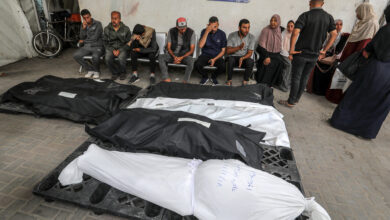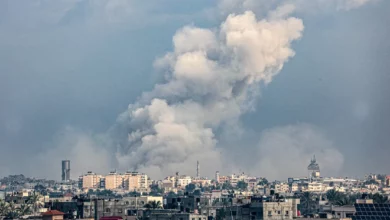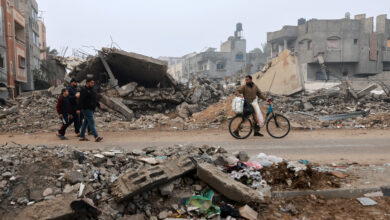–
“Palestine,” said Lebanese novelist Elias Khoury, “is my country of choice.”
Under the banner of “Translating Palestine,” Khoury spoke on Monday night at the American University in Cairo's downtown campus with translator Humphrey Davies and filmmaker Yousry Nasrallah.
Khoury was not born of Palestinian parents. Instead, he said, he has adopted the country as his own. He talked about his attempt to tell Palestinians’ stories in the context of his 1998 novel “Gate of the Sun.”
The book, he told the crowded hall, “is not the love story of Yunis to Naheeleh or Khalid to Shams, but it is my love story to Palestinians.”
One of the inspirations for his dense, circular, and layered novel was the “1,001 Nights.” He characterized the “Nights” as a struggle between power and culture, between official history and human stories. Official histories are written by the victors, he said, while the stories are what lie beneath.
“Gate of the Sun,” with its 300-odd individual stories, is fashioned as a challenge to the idea of master narrative. The stories are not straightforward reportage, but are constantly thrown into question. As translator Humphrey Davies noted, the book draws its authority from its ongoing doubt.
The process of writing the book – which was voted one of the “top 105” novels of the 21st century by the Arab Writers Union – took Khoury seven years. But these were perhaps just the first seven, as the book remains an unfinished project.
“There is a big error in the Arabic edition,” Khoury said, “which I would like to correct but my publisher didn't. The novel does not end with a full stop. That's how it's designed. Because it's an open [ending]. And I wanted an open ending.”
Khoury decided on an open ending because, “1948 is not the date of the Nakba,” he said. “Because the Nakba is not in the past.”
He originally thought that the book would have a cathartic effect. If he wrote down Palestinians’ memories of their 1948 expulsion from their land, then the Palestinians and Arabs would be able to move on. "This was the hypothesis," Khoury said.
But, through the process of interviewing people and writing the book, he discovered that he was totally wrong.
“The Nakba is not in the past,” he said. “The Nakba is the present in the refugee camps. The Nakba is not only taking place now in Palestine, it's taking place now in the Arab world. Sabra and Shatila was the Nakba. Tall al-Zatar was the Nakba. The civil situation of the Palestinians in Lebanon is part of the Nakba. The siege of Gaza is part of the Nakba. So the Nakba is a continuous process.”
Egyptian filmmaker Yousry Nasrallah, who adapted “Gate of the Sun” to a four-and-a-half hour film, talked about the difficult relationship between Egyptians and Palestinians. Regimes such as Mubarak’s, he said, had been “using Palestine to repress us.” Those regimes told people: "You do not exist because Palestine does not exist."
The regimes appropriated the story of Palestine, Nasrallah said. Making a film version of “Gate of the Sun” was his chance to take back the story.
Nasrallah's film is not a mirror of the novel, but a creative interpretation, and it ends quite differently from the book. The last line of the book, in Davies’ translation, is, “I stretch out my hand, I grasp the ropes of the rain, and I walk and walk and walk…”
This could not be translated easily to film. Where is Khaleel walking? What does it mean? The author and the filmmaker discussed the ending for a long time.
In the end, Nasrallah decided to interpret the ending as a return to Palestine. “And I love it,” Khoury said. “My novel that I am beginning now begins with Khaleel in Palestine. So actually, Yousry’s interpretation inspired me.”
Khoury spoke briefly about the new novel. Indeed, he said, the only way forward is to have Khaleel leave the camps and return to Palestine. The author did not address whether this new novel might be left open-ended or whether it might come to a final, full stop. He also didn’t talk about his expectations for Palestinian statehood or the current political events. But he did say, “It is my deep belief that the story will, in the end, prevail.”




